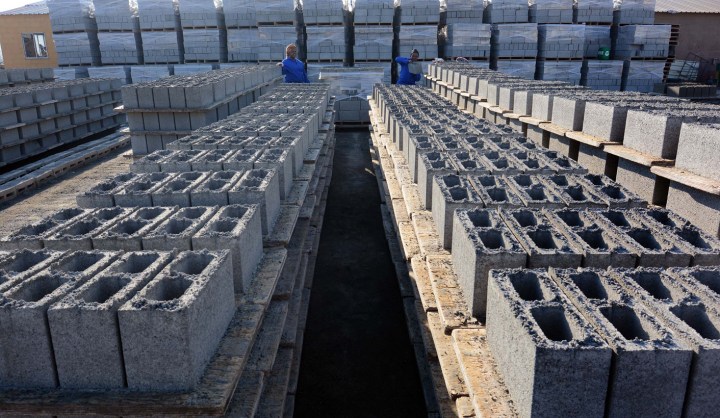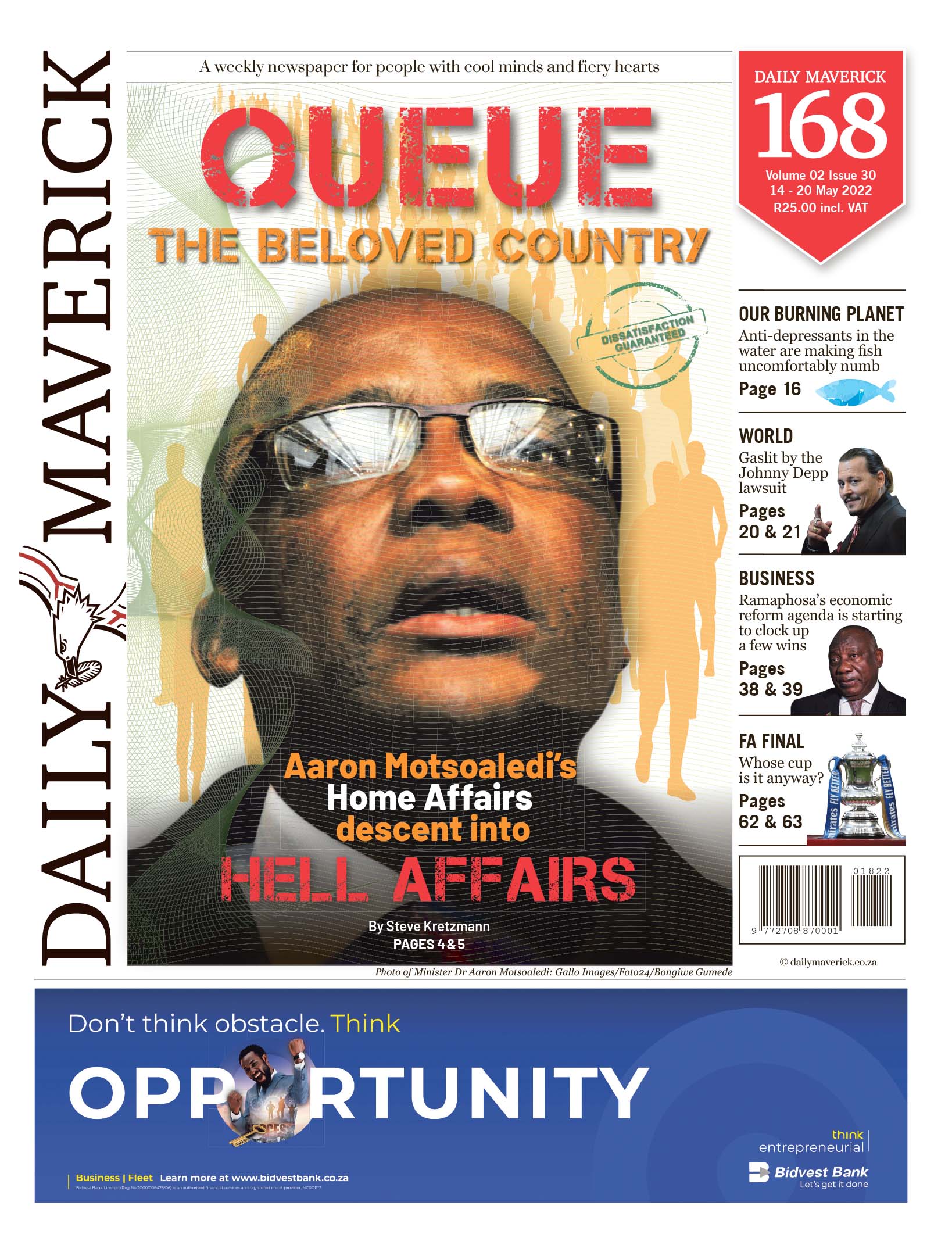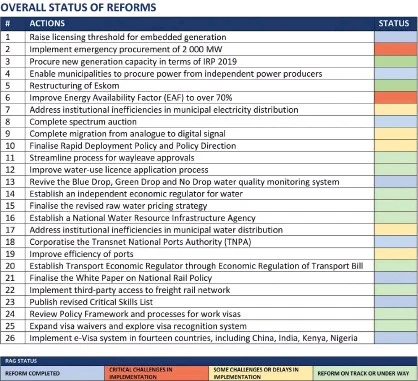ECONOMIC REFORMS
SA’s structural progress gains momentum, but two potholes are in the way: red tape and the power crisis

Finally, the government is making progress in pro-growth and investment reforms in critical sectors such as electricity, water and digital communications. But their implementation is being let down by bureaucracy.
The good news is that President Cyril Ramaphosa’s economic reform agenda — the only card South Africa has to grow the economy, create jobs and boost private sector investments — is starting to clock up a few wins.
Two years ago, Ramaphosa launched Operation Vulindlela, a joint initiative between the Presidency and the National Treasury that seeks to support and motivate government departments to change the fabric of the economy by implementing a small number of pro-growth and investment reforms. Since then, out of the 26 measures that Operation Vulindlela has proposed, eight have been completed across network industries, including electricity, water, digital communications and the visa/immigration regime.
People and companies are now allowed to generate electricity for their own needs by up to 100MW, municipalities can procure electricity from independent power producers, and broadband spectrum worth R14.4-billion was recently auctioned to telecommunication companies — a first in 18 years.
In other sectors, Operation Vulindlela has revived the blue- and green-drop water quality assessment system for the first time since 2014 to speed up the issuing of licences for the provision of water to communities; the e-visa system has been revamped to boost the tourism industry; and a list of critical skills has been published to attract foreign expertise into South Africa.
These eight measures are essential for making it easier for businesses to do business, restoring competitiveness, and unlocking investments and confidence so that the country’s potential growth remains above 3% in the long term.
Although the government is finding its reform implementation groove, most of the completed reforms have focused on making long-mooted regulatory changes instead of actual reforms being delivered. An area in which there has been clear reform delivery is the recent auction of spectrum, which has injected R14.4-billion into the fiscus and brings the promise of telecommunications companies unleashing investments in the next six months to improve their network quality and lower mobile data costs.
In addition to the eight completed reforms, 11 other measures are on track or under way, five are delayed, and two are facing worrying implementation problems.
Delays in energy reforms
Energy reforms have gone in the wrong direction.
Months after liberalising the electricity supply market, megawatts have not been added to the national grid from the energy reforms identified by Operation Vulindlela. Instead, Eskom’s power cuts have intensified, with stop-start load shedding.
Eskom’s target of achieving a 70% of energy availability factor (EAF) — the number of plants in good working condition and available to distribute electricity — is becoming out of reach. Operation Vulindlela has also embraced a 70% EAF target, which is required for Eskom’s power stations to perform optimally. Eskom chief operating officer Jan Oberholzer revealed that the EAF remains “very poor” at about 62%, adding that a 70% target is not realistic as the EAF outlook for the year will likely fall further.
The process to urgently procure 6,800MW from renewable energy players – known as the Risk Mitigation Independent Power Producer Procurement Programme, which was first proposed in 2019 – has faced ongoing litigation and administrative delays. Since the procurement programme was released to the market in August 2020, fewer than five of the 58 renewable energy projects, mainly from the mining sector, have been registered. The delivery of some of the renewable projects is hampered by the red tape imposed by the National Energy Regulator of SA (Nersa), which has onerous registration requirements before energy can be fed to Eskom and then the grid.
The delays in getting reforms over the line can be explained by Operation Vulindlela’s mandate. Operation Vulindlela cannot implement reforms or take over government functions. But it provides oversight on the government’s work of mounting reforms and provides skills and technical support to unblock any obstacles to microeconomic reforms.
When Operation Vulindlela was launched, Cabinet ministers were initially reluctant to embrace its intervention, often leading to delays in the implementation of reforms. Lack of state capacity owing to weak leadership and governance, and intense policy contention often led to Operation Vulindlela being snubbed.
Rudi Dicks, the head of the project management unit in the Presidency, says that Operation Vulindlela is now receiving overwhelming support. The initiative’s focus is ensuring that the reform agenda is moving with speed, says Dicks. “We don’t have time. We have already spent many years not reforming the economy to grow it so that jobs can be created. We need to ensure that we track the delivery of reforms and ensure that they have a real impact.”
Dicks acknowledges that there are delays with the implementation of energy reforms, saying that reforming South Africa’s electricity system is complex because it cuts across many government departments (Treasury, Department of Public Enterprises, Mineral Resources and Energy, and Environmental Affairs) and entities (Eskom and financial institutions). Often, these parties have opposing ideas on how to solve the energy and climate change crisis.
“The energy matter must be managed in a manner that ensures we deliver on restructuring the energy market to deliver energy security and cheaper access to electricity for industry and households,” says Dicks.
Critics weigh in
Organised business has praised some of the reform progress delivered so far. But business remains sceptical, saying its impact on the economy is limited because many reform measures are still stuck in red tape.
Says Business Unity SA (Busa) CEO Cas Coovadia: “We welcomed the announcement by President Cyril Ramaphosa of the raising of the ceiling to 100MW. However, private sector generators of power are still hampered by inappropriate processes and regulations in Nersa, which make it difficult to act on the reform. We find similar issues with the critical skills list and other reforms. The issue is thus the capability and commitment of government departments to clear red tape hampering business leveraging off the reforms.”
It will take a long time before the positive impact of reforms reflects in economic indicators. Economies tend to struggle in the early years of reforms being implemented because tough economic decisions are taken and bad past practices are done away with. This has been seen in countries such as Brazil, India, Mexico, Argentina and Romania, where attempts were made to remove investment blockages between the late 1990s and early 2000s.
Dr Lumkile Mondi, a senior lecturer at Wits University’s School of Economics and Finance, says that it can take between three and five years before measurable benefits can be achieved from reform measures. He says a long period of high unemployment and low growth is here to stay.
The National Treasury’s economic outlook supports Mondi’s views. The economy will be in a downward spiral from 2022: slowing to 2.1% in 2022 (from expected growth of 4.8% in 2021) and 1.6% in 2023, and record marginal growth of 1.7% in 2024. DM168
This story first appeared in our weekly Daily Maverick 168 newspaper, which is available countrywide for R25.





















 Become an Insider
Become an Insider
Comments - Please login in order to comment.